Transcription
Reply ID:
yayc
September 27, 2017
Dear BostonRocks,
Over the years, I've noticed that the more controversial the issue, the more passionate the opposing parties are when expressing their points-of-view. This isn't necessarily wrong, or even bad. It's just a "statement of fact," but sometimes, a person's passion has a tendency to give them "tunnel vision," clouding a person's ability to even attempt to see things from the other person's point-of-view. If you ask me, it's this inability to try to understand the other person, and not the beliefs themselves, that so frequently keep people divided and at each others' throats. I say this, not to imply that you're so passionate in your beliefs that you can't, or won't, try to see an opposing viewpoint, but because I think it's a good point that merits being mentioned before continuing, especially sine this is a public forum, open to everyone, including those who are so passionate about their beliefs that they unknowingly refuse to even listen to the other person's point-of-view, let alone put themselves in their shoes.
With that said, let me first start off by saying that you're right. Being transgender or gay has NOTHING to do with religion, but in my defense, I never implied that it did. Religion was an important part of my article, but not for those reasons. The issue of religion, or rather, religious beliefs, pointed out in an attempt to get my readers to understand the opposing viewpoint, but any further explanation on that now would be getting ahead of myself, so I'll table the issue for the moment.
As far as the viewpoint that being "transgender or gay" being about wanting "equal rights" (let's not forget about the lesbians and bisexuals in this equation), again, I completely agree with you, and once again, I'm confused as to how anything I wrote could have been interpreted to the contrary. The article had absolutely nothing whatsoever to do with how anyone in the LGBT community should be denied anything. It was merely written to force a discussion on the issue of whether transgenders should be forced to reveal their status as a transgender or not, and why, or why not, they should be.
I find it incredibly fascinating that, after reading what I write, your response was to point out that being "transgender or gay" (in an attempt to avoid leaving anyone out, I'll just say "LGBT" from now on), had nothing to do with religion, but was in fact about equal rights. What exactly does equal rights mean to you? If what you're after is for members of straight community to treat members of the LGBT community the same way they treat each other, then congratulations! There's no need for any further discussion, because this is exactly what's been happening since the beginning of time. Throughout history, members of the straight community have sought to convert those who disagreed with them, and when that didn't work, ostracize, enslave or annihilate the opposition. It was only after years, decades or even centuries of struggle that straights with opposing opinions and beliefs were finally allowed to live their life on their terms. And in case you haven't figured it out yet, that was meant to be a tongue-in-cheek comment on the reality of the situation. When you say "equal rights," I suspect that what you really mean is for members of the straight community to respect the opinions and beliefs of members of the LGBT community, in the same way that they respect their own opinions and beliefs, i.e., the right to marry, the right to have children, naturally or by way of adoption, the right to inherit property from their spouse without being forced to pay taxes on it, and perhaps most importantly, the right to be judged on their merits as a person, not their sexual orientation. "Equality," however, is a two-edged sword. If members of the LGBT community truly want to be treated with equality and respect, particularly when it comes to views that run contradictory to those held by members of the straight community, then the LGBT, as a whole, needs to be willing to treat members of the straight community with the same equality and respect they're demanding. This was why I found your comment on equality so fascinating. You want the straight community to respect the opinions and beliefs of the LGBT community, but the very fact that we're having this discussion proves that there are those who want their opinions and beliefs to be respected, but who aren't willing to extend that same courtesy in return.
When I wrote this article, I did so from the perspective of someone with a deeply set of religious beliefs. I did so for several reasons. First, there are literally hundreds of thousands, if not hundreds of millions of people who share these very religious beliefs. These are people who believe that a person born a man will always be a man in God's eyes, just as a person born a woman will always be a woman in God's eyes, surgical reassignment surgery notwithstanding. These are also people who believe that homosexuality is an abomination to God. This doesn't mean that their beliefs are right or wrong, nor that these are beliefs that I share, just that these are their beliefs, so how can I understand where their coming from without at least trying to put myself in their shoes? Another reason I wrote from their point of view was because of the very real possibility that this very scenario would one day happen, and lest you think this is an impossibility, think about the talk show Sally Jesse Raphael. For those of us old enough to remember the show, a guest on the show revealed to his male friend, on national television, that he had a crush on him. As I understood it, his friend waited in the parking lot after the show, at which point he killed him.
The point here is that, right or wrong, there are people who have these beliefs, and if members of the LGBT community wish to have their opinions and beliefs on same sex relationships treated with equality and respect, then they too must be willing to treat the beliefs of those in the straight community, even those that appear to be extreme, with that same equality and respect. This doesn't mean that they need to agree with those opinions and beliefs, just that they're willing to demonstrate a sense of fairplay where those beliefs are concerned. Isn't this only fair?
As far as comparing rape to a transgender having sex without disclosing their status to their partner is concerned, it might help to understand that there are, literally, dozens of definitions when it comes to the term "rape." First, there's the obvious, and most common definition, rape by use of force, in which a person uses threats or even physical violence to physically forcefully penetrates his (or her) victim. There's also what's most commonly referred to as "statutory rape," in which the victim is under the age of consent. Ironically, there are many states in which this can happen even when the "perpetrator" is also under the age of consent, but that's an argument for another day.
Another definition of rape is when the victim is incapable of giving their consent because they're intoxicated. The common misconception is that, for this to happen, the victim has to actually be passed out before or during the act of intercourse, but the truth of the matter is that, at least in most states, this can technically occur when the victim doesn't appear to be under the influence, but is nevertheless too intoxicated to operate a motor vehicle. This definition also applies when the inability to give legal consent is caused by drugs instead of alcohol, and contrary to popular belief, it doesn't matter who cause the victim's state of mine, intentionally getting high or drunk, or plied with drugs or alcohol to create a victim incapable of giving consent, the end result is the same in the eyes of the law, meaning that it's legally rape.
In some states, the definition of rape was expanded to include instances in which the victim was essentially tricked into having sex because their attacker pretended to be someone they weren't. For example, assume that a married couple (we'll call them Bill and Mary, for the sake of clarity), rents out a room to a young man named Tommy. Bill gets off work really, really late, long after Mary goes to sleep, and one night, long after Mary falls asleep, Tommy slips into her bed and starts fondling her in her sleep. She wakes up, aroused, and asks "Bill?" Tommy's response is "yeah, baby, it's me," and they proceed to have sex, with her being completely unaware because of how dark it is that it's not Bill she's having sex with, but is instead her new roommate, Tommy. Under California law, this would be rape.
And then there's California Penal Code section 261(4), which says that rape is "[w]here a person is at the time unconscious of the nature of the act, and this is known to the accused. As used in this paragraph, 'unconscious of the nature of the act' means incapable of resisting because the victim meets any of one of the following conditions: [...] (C) [w]as not aware, knowing, perceiving, or cognizant of the essential characteristics of the act due to the perpetrator's fraud in fact." This may not be a definition you agree with, or one that was intended to include transgenders failing to disclose their status to their partner prior to engaging in acts of sexual intercourse, but such is the way the law works. It's often twisted and manipulated so that a square peg fits into a round hole, but in this instance, I don't think any twisting or manipulation is required. When you boil away all of the extraneous legal definitions and focus on the actual feelings associated with being raped. Betrayal, confusion, rage, hurt, humiliation, shame... These feelings barely even being to scratch the surface, and technical definitions notwithstanding, victims of rape, regardless of the format it takes, experience each and every one. The difference is that, for most rape victims, they're able to take solace in that fact that this wasn't something they wanted, but with a man who was just tricked into having sex with a transgender, it's not quite so clear-cut.
Other posts by this author
|
2020 aug 12

|
2020 aug 12

|
2020 may 30

|
2020 may 30

|
2020 may 30

|
2020 may 24

|
More... |


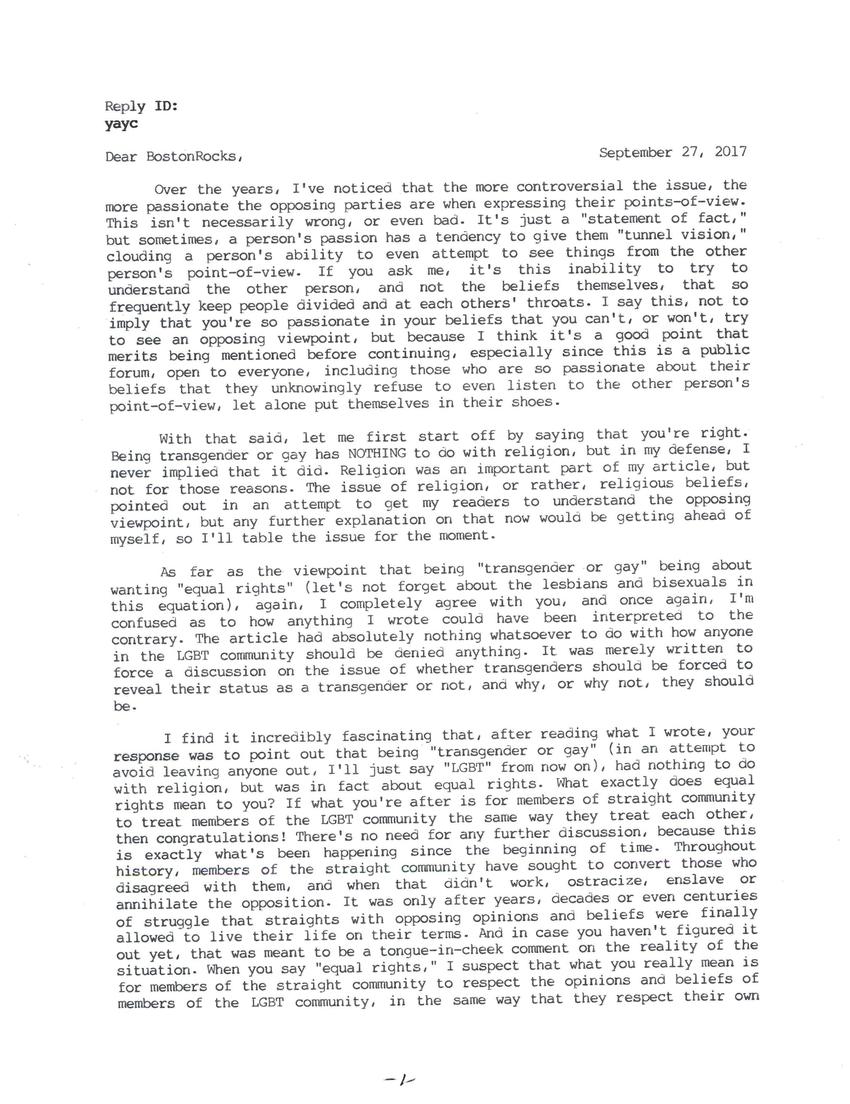
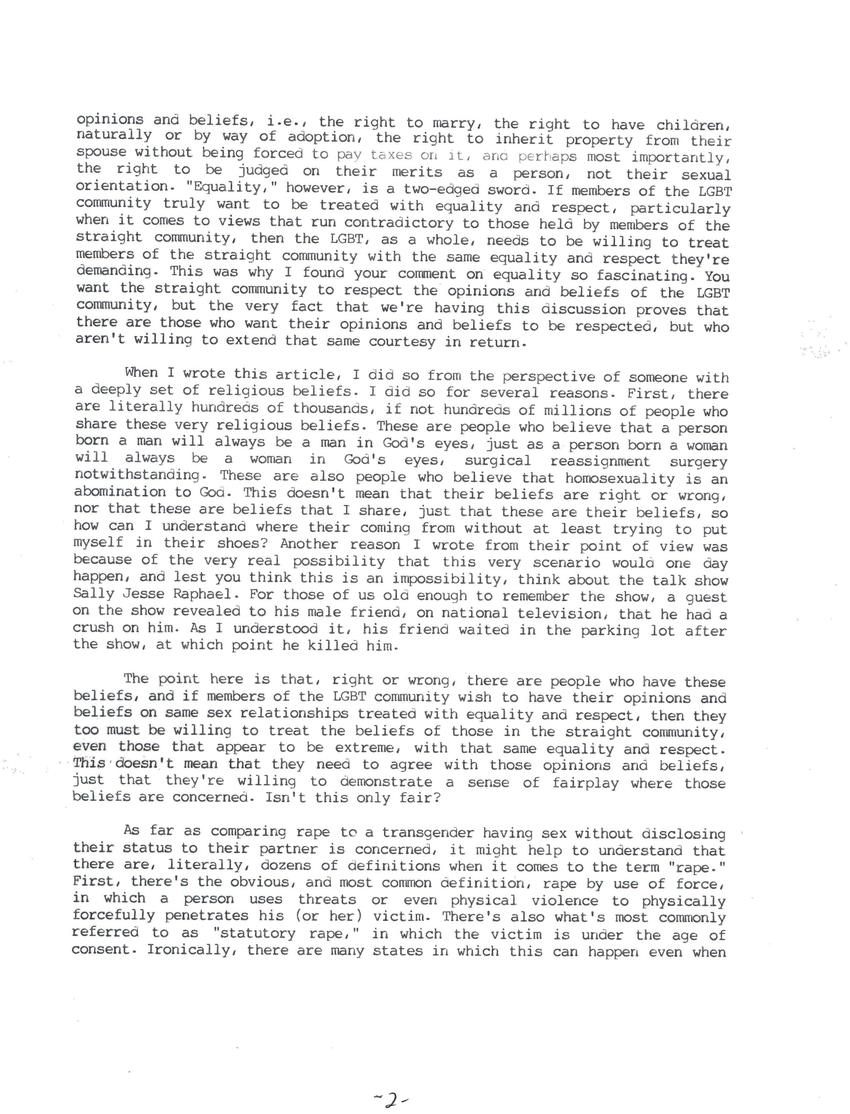
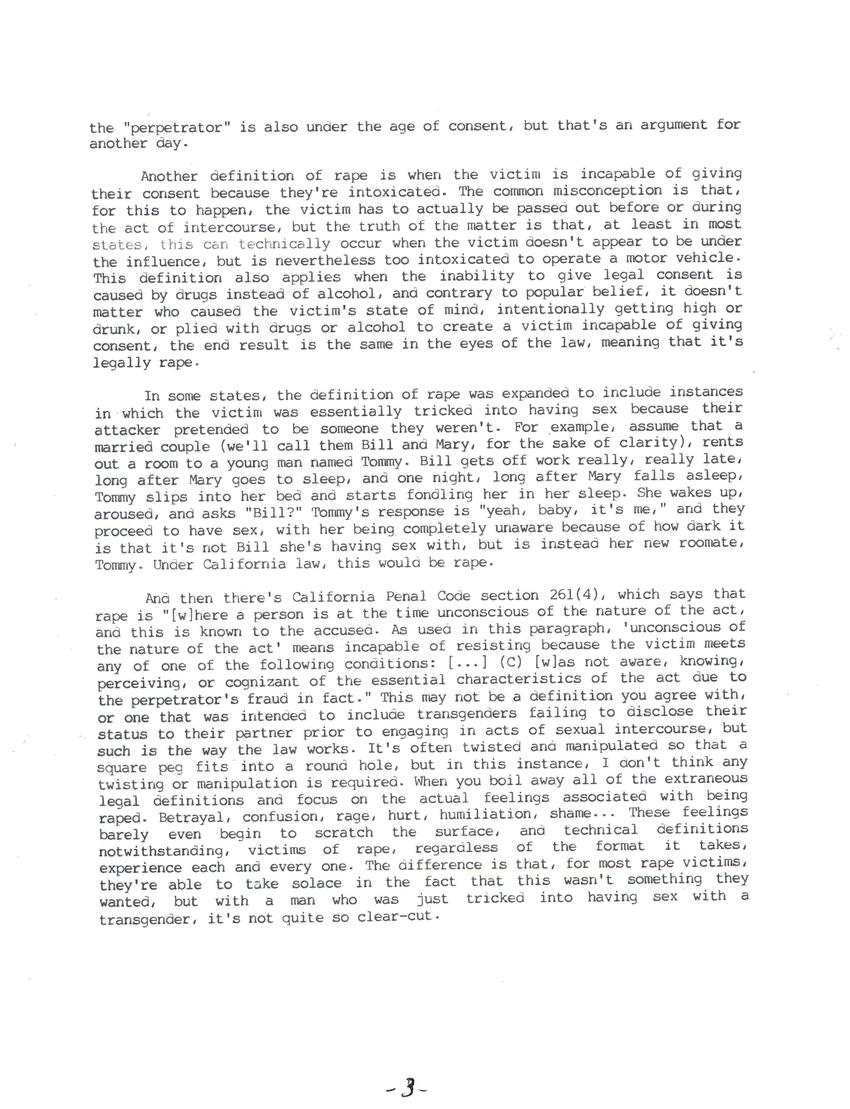
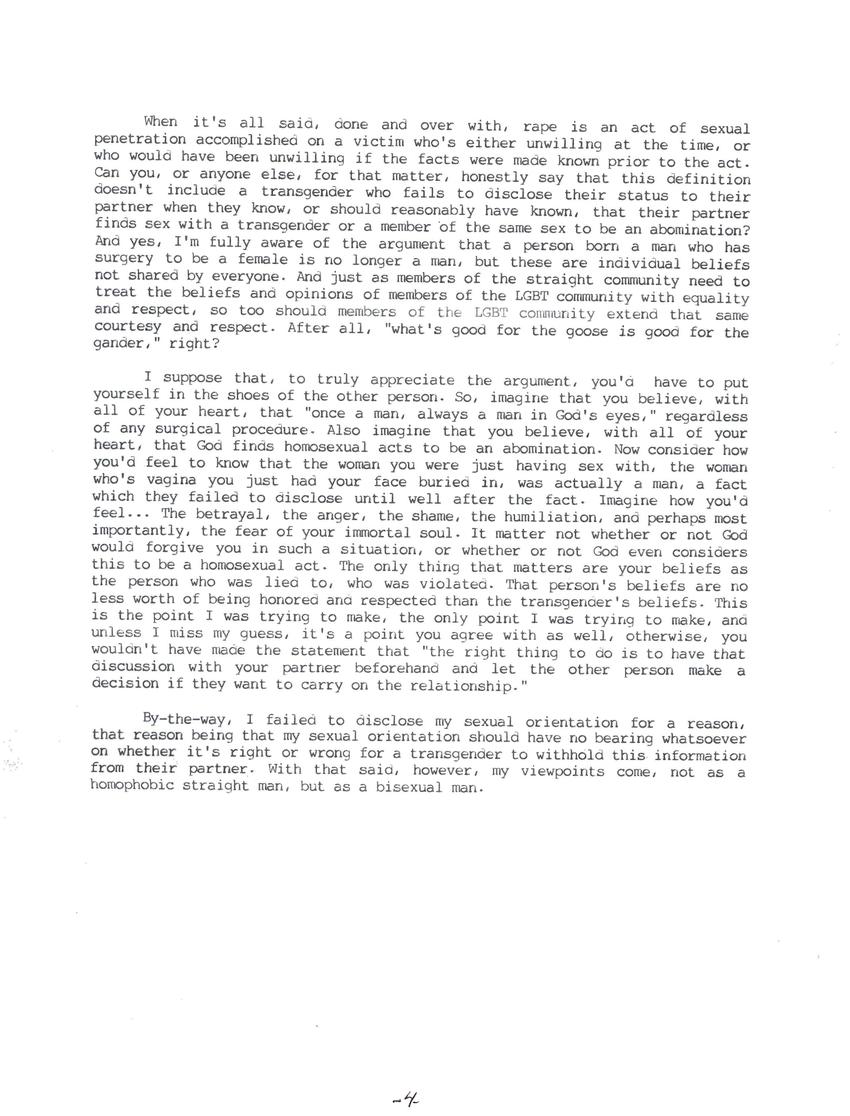
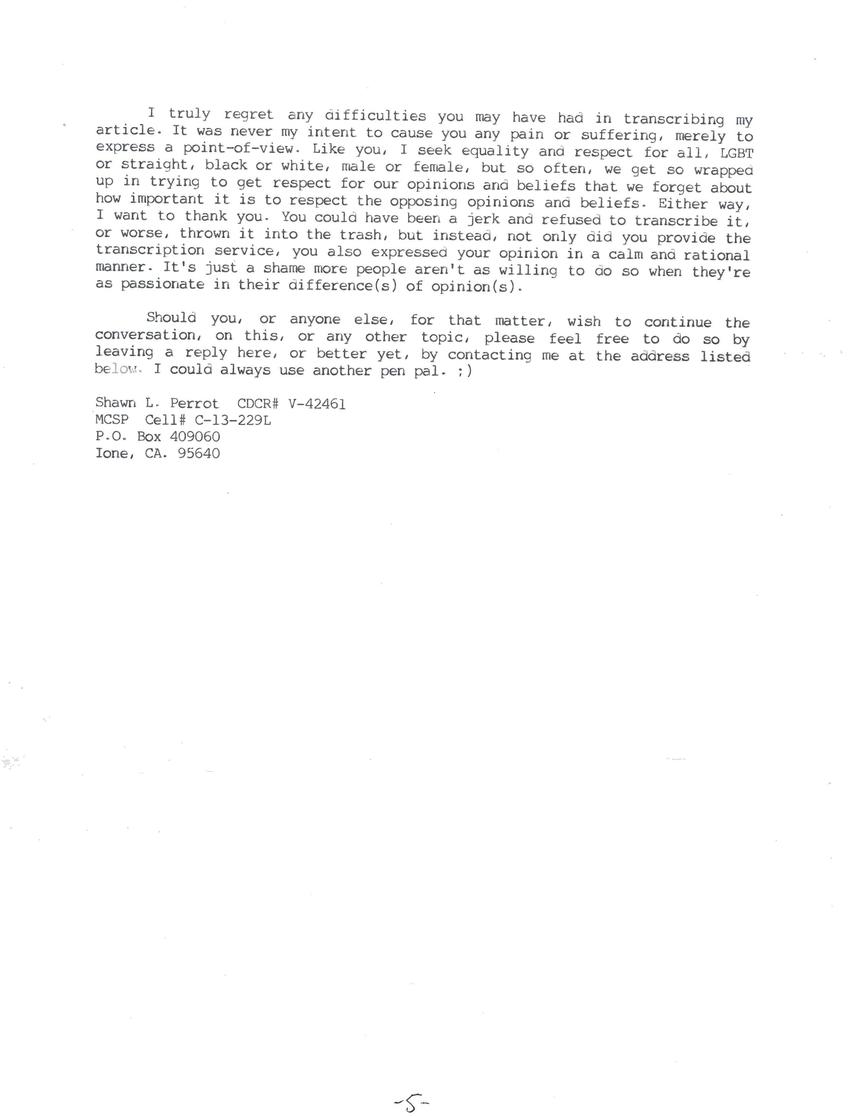

Replies